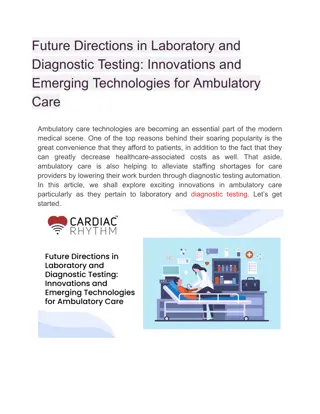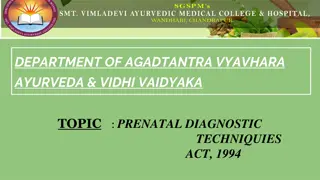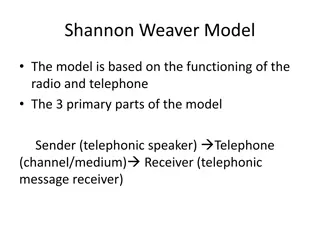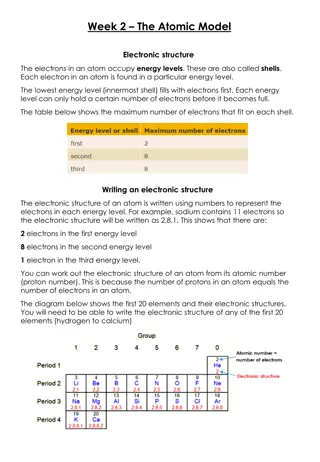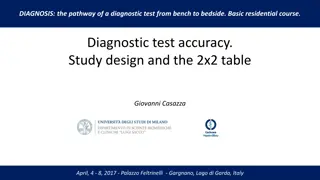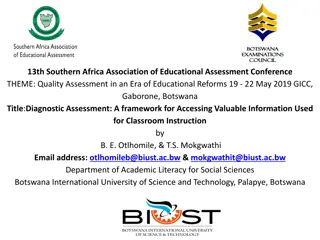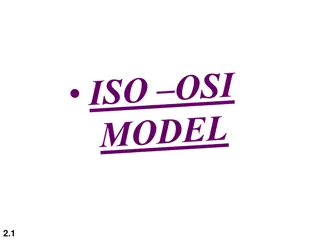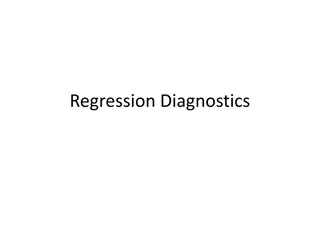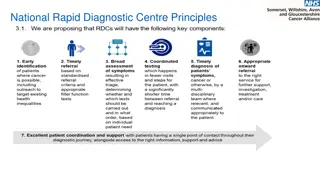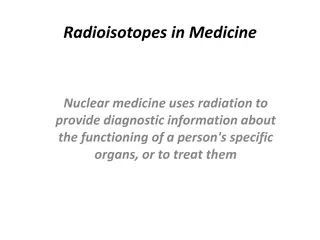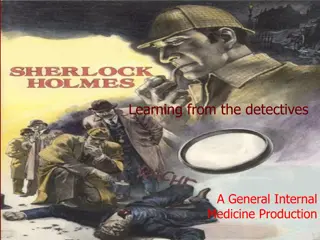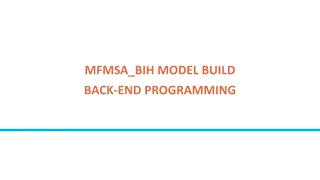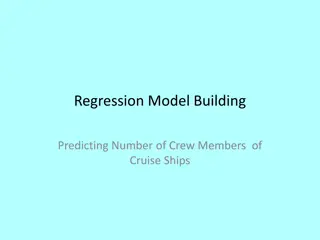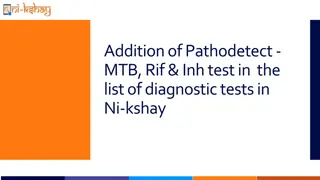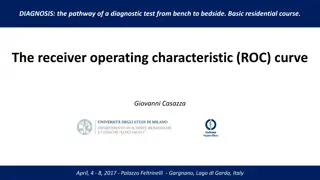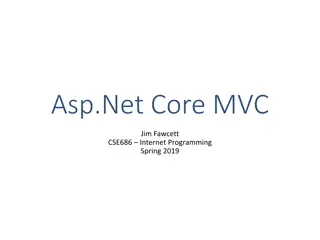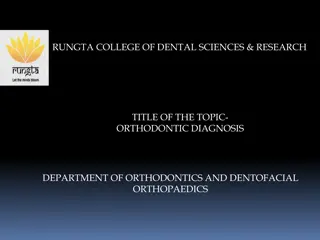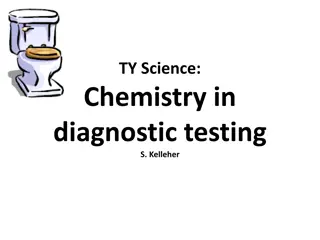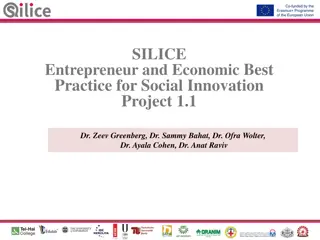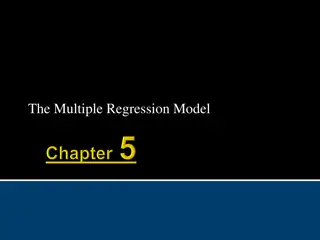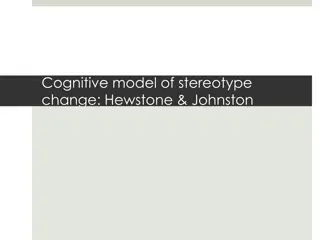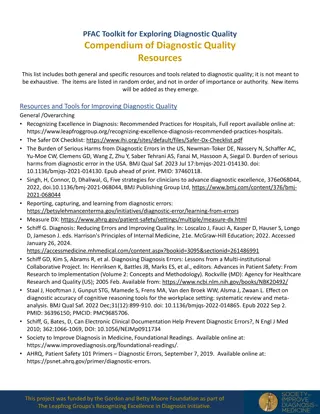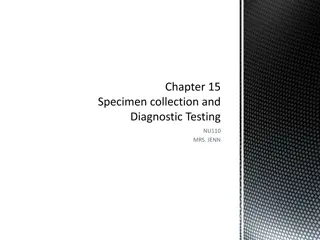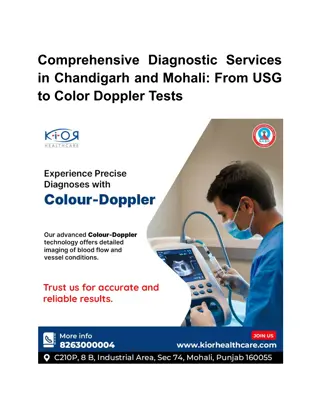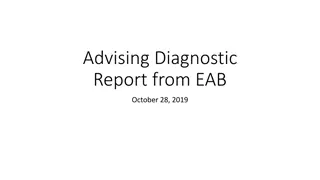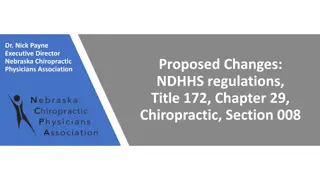Building a Macrostructural Standalone Model for North Macedonia: Model Overview and Features
This project focuses on building a macrostructural standalone model for the economy of North Macedonia. The model layout includes a system overview, theory, functional forms, and features of the MFMSA_MKD. It covers various aspects such as the National Income Account, Fiscal Account, External Accoun
2 views • 23 slides
Understanding Diagnostic Test Evaluation and Performance
Explore the intricacies of evaluating diagnostic tests, including precision, sensitivity, specificity, and factors influencing test performance. Learn about the purpose of diagnostic tests, examples across various fields, and the types of studies used to assess them.
9 views • 53 slides
NAMI Family Support Group Model Overview
This content provides an insightful introduction to the NAMI family support group model, emphasizing the importance of having a structured model to guide facilitators and participants in achieving successful support group interactions. It highlights the need for a model to prevent negative group dyn
6 views • 23 slides
Future Directions in Laboratory and Diagnostic Testing_ Innovations and Emerging Technologies for Ambulatory Care
Ambulatory care technologies are becoming an essential part of the modern medical scene. One of the top reasons behind their soaring popularity is the great convenience that they afford to patients, in addition to the fact that they can greatly decrease healthcare-associated costs as well. That asid
12 views • 5 slides
Understanding the Prenatal Diagnostics Techniques Act of 1994 in India
The Prenatal Diagnostic Techniques Act of 1994 in India aims to curb female foeticide and address the dwindling sex ratio by prohibiting prenatal sex determination. This legislation regulates diagnostic methods, prevents sex selection, and focuses on detecting genetic disorders, metabolic abnormalit
0 views • 15 slides
Understanding Entity-Relationship Model in Database Systems
This article explores the Entity-Relationship (ER) model in database systems, covering topics like database design, ER model components, entities, attributes, key attributes, composite attributes, and multivalued attributes. The ER model provides a high-level data model to define data elements and r
0 views • 25 slides
Communication Models Overview
The Shannon-Weaver Model is based on the functioning of radio and telephone, with key parts being sender, channel, and receiver. It involves steps like information source, transmitter, channel, receiver, and destination. The model faces technical, semantic, and effectiveness problems. The Linear Mod
0 views • 8 slides
Understanding Atomic Structure: Electrons, Energy Levels, and Historical Models
The atomic model describes how electrons occupy energy levels or shells in an atom. These energy levels have specific capacities for electrons. The electronic structure of an atom is represented by numbers indicating electron distribution. Over time, scientists have developed atomic models based on
0 views • 5 slides
Diagnostic Test Accuracy Study: Design and Implementation
This content delves into the pathway of a diagnostic test from development to clinical application, focusing on the basic concepts of diagnostic test accuracy, study design, the 2x2 table, and key terminology. It discusses the importance of study design in assessing diagnostic accuracy, including fa
0 views • 16 slides
Understanding ROC Curves and Operating Points in Model Evaluation
In this informative content, Geoff Hulten discusses the significance of ROC curves and operating points in model evaluation. It emphasizes the importance of choosing the right model based on the costs of mistakes like in disease screening and spam filtering. The content explains how logistical regre
7 views • 11 slides
Enhancing Educational Assessment Through Diagnostic Techniques
Diagnostic Assessment (DA) is a valuable technique that provides detailed information about students' knowledge and skills, supporting teachers in identifying strengths and weaknesses for tailored instruction. This approach offers a more nuanced understanding than traditional assessments, contributi
0 views • 20 slides
Understanding the OSI Model and Layered Tasks in Networking
The content highlights the OSI model and layered tasks in networking, explaining the functions of each layer in the OSI model such as Physical Layer, Data Link Layer, Network Layer, Transport Layer, Session Layer, Presentation Layer, and Application Layer. It also discusses the interaction between l
1 views • 41 slides
Regression Diagnostics for Model Evaluation
Regression diagnostics involve analyzing outlying observations, standardized residuals, model errors, and identifying influential cases to assess the quality of a regression model. This process helps in understanding the accuracy of the model predictions and identifying potential issues that may aff
1 views • 12 slides
Prostate Rapid Diagnostic Service Transformation Overview
The document outlines the transformation of the Prostate Rapid Diagnostic Service (RDS), detailing plans, due diligence requirements, implementation timelines, and good practices such as virtual telephone triage systems and use of MRI before biopsies. It emphasizes the implementation of Rapid Diagno
4 views • 8 slides
Diagnostic Specialty Antibodies Market, Diagnostic Antibody, Infectious Disease
Diagnostic Specialty Antibodies Market by Type (Primary, Secondary), Clonality (Monoclonal, Polyclonal), Technique (WB, Rapid Test, IHC, IP), Conjugate, and Application (Dengue, Malaria, Hepatitis, HIV, E. coli , Tuberculosis, Pneumonia, Cancer)- For
0 views • 3 slides
Applications of Radioisotopes in Nuclear Medicine
Nuclear medicine utilizes radioisotopes to provide crucial diagnostic information about the functioning of specific organs and to treat various conditions. Diagnostic techniques in nuclear medicine involve using radioactive tracers that emit gamma rays from within the body. Positron Emission Tomogra
0 views • 19 slides
SWAG Cancer Alliance Rapid Diagnostic Services Implementation Plan
The SWAG Cancer Alliance aims to develop Rapid Diagnostic Services for patients with non-specific symptoms within Primary Care Networks. By 2028, the goal is to diagnose 75% of cancers at Stage 1 & 2, emphasizing personalized, timely diagnoses integrated with existing diagnostic provision. The appro
0 views • 8 slides
Learning from Fictional Detectives for Better Diagnostic Skills
Explore the application of lessons from fictional detectives like Sherlock Holmes to enhance diagnostic processes in medicine. Delve into problem representation, observation, deduction, and clinical reasoning strategies to improve diagnostic accuracy and patient care.
0 views • 68 slides
MFMSA_BIH Model Build Process Overview
This detailed process outlines the steps involved in preparing, building, and debugging a back-end programming model known as MFMSA_BIH. It covers activities such as data preparation, model building, equation estimation, assumption making, model compilation, and front-end adjustment. The iterative p
0 views • 10 slides
Proposal for Radio Controlled Model Aircraft Site Development
To establish a working relationship for the development of a site suitable for radio-controlled model aircraft use, the proposal suggests local land ownership with oversight from a responsible agency. Collins Model Aviators is proposed as the host club, offering site owner liability insurance throug
0 views • 20 slides
UBU Performance Oversight Engagement Framework Overview
Providing an overview of the UBU Logic Model within the UBU Performance Oversight Engagement Framework, this session covers topics such as what a logic model is, best practice principles, getting started, components of the logic model, evidence & monitoring components, and next steps. The framework
0 views • 33 slides
Regression Model for Predicting Crew Size of Cruise Ships
A regression model was built to predict the number of crew members on cruise ships using potential predictor variables such as Age, Tonnage, Passenger Density, Cabins, and Length. The model showed high correlations among predictors, with Passengers and Cabins being particularly problematic. The full
0 views • 16 slides
Exact Byzantine Consensus on Undirected Graphs: Local Broadcast Model
This research focuses on achieving exact Byzantine consensus on undirected graphs under the local broadcast model, where communication is synchronous with known underlying graphs. The model reduces the power of Byzantine nodes and imposes connectivity requirements. The algorithm involves flooding va
0 views • 7 slides
Enhancing Diagnostic Tests with Pathodetect in Ni-kshay Module
A new test type, Pathodetect-MTB, Rif & Inh, has been introduced for tuberculosis diagnosis in Pathodetect laboratories. This test has been added to the diagnostic tests list in the Ni-kshay module, enabling seamless reporting in TB diagnostic facilities. The process of adding this test, including s
0 views • 10 slides
Understanding Diagnostic Test Accuracy: A Practical Overview
Navigate through the pathway of diagnostic test development, implementation, and evaluation from bench to bedside. Explore the Receiver Operating Characteristic (ROC) curve, the impact of cut-off variations on sensitivity and specificity, and the practical application of continuous measurement in di
0 views • 32 slides
Calibration of Multi-Variable Rainfall-Runoff Model Using Snow Data in Alpine Catchments
Explore the calibration of a conceptual rainfall-runoff model in Alpine catchments, focusing on the importance of incorporating snow data. The study assesses the benefits of using multi-objective approaches and additional datasets for model performance. Various aspects such as snow cover, groundwate
0 views • 16 slides
Understanding Asp.Net Core MVC - Building Web Applications with Model-View-Controller Pattern
Asp.Net Core MVC is a framework for building web applications based on the Model-View-Controller pattern. The model manages application data and constraints, views present application state, and controllers handle requests and actions on the data model. Learn about the MVC structure, life cycle, mod
0 views • 22 slides
Diagnostic Approaches in Hematologic Disorders: A Comprehensive Overview
Explore the diagnostic considerations for multiple myeloma, monoclonal gammopathy of undetermined significance (MGUS), and related conditions, including indications for serum protein electrophoresis (SPEP) and free light chain (FLC) testing. Learn when not to order SPEP and FLC, and consider various
0 views • 24 slides
Orthodontic Diagnosis: Essential Tools and Techniques
This detailed guide covers essential diagnostic aids for orthodontic diagnosis, including case history, general examination, intraoral examination, supplemental diagnostic aids, orthodontic study models, diagnostic setups, facial photographs, electromyography, radiographs, recent advances, and more.
0 views • 39 slides
Understanding X-CAPM: An Extrapolative Capital Asset Pricing Model
This paper discusses the X-CAPM model proposed by Barberis et al., which addresses the challenges posed by investors with extrapolative expectations. The model analytically solves a heterogeneous agents consumption-based model, simulates it, and matches various moments. It explores how rational inve
0 views • 23 slides
Utilizing Different Samples for Diagnostic Testing in Medicine
The practice of diagnostic testing in medicine goes beyond blood and stool samples. Gathering urine samples, for example, allows healthcare providers to assess various health aspects, such as kidney function, urinary tract infections, diabetes, and more. By examining the color, clarity, odor, densit
0 views • 21 slides
Innovation and Social Entrepreneurship Initiatives in Higher Education
This project focuses on establishing a leading center for promoting innovation and social entrepreneurship within higher education institutions. It aims to encourage students and staff to develop creative solutions for community challenges, expand social involvement, and foster sustainable positive
0 views • 13 slides
Principles of Econometrics: Multiple Regression Model Overview
Explore the key concepts of the Multiple Regression Model, including model specification, parameter estimation, hypothesis testing, and goodness-of-fit measurements. Assumptions and properties of the model are discussed, highlighting the relationship between variables and the econometric model. Vari
1 views • 31 slides
Cognitive Model of Stereotype Change: Three Models Explored
The Cognitive Model of Stereotype Change, as researched by Hewstone & Johnston, delves into three key models for altering stereotypical beliefs: the bookkeeping model, the conversion model, and the subtyping model. These models suggest strategies such as adding or removing features to shift stereoty
0 views • 58 slides
Toolkit for Exploring Diagnostic Quality Resources
A compendium of resources and tools for improving diagnostic quality, covering general and specific aspects. It includes recommendations for hospitals, checklists, research on diagnostic errors, strategies for clinicians, cognitive reasoning tools, readings on diagnostic errors, and more. The list i
0 views • 5 slides
Understanding Bohr's Model of the Hydrogen Atom
Exploring the significance of Bohr's hydrogen model in physics, this lecture delves into the Bohr radius, the correspondence principle, and the success and limitations of his model. Discover how characteristic X-ray spectra contribute to our understanding of atomic structures, leading to the conclus
0 views • 14 slides
Guidelines for Safe and Efficient Diagnostic Testing Procedures
This content provides detailed guidelines and procedures for specimen collection and diagnostic testing in healthcare settings, covering aspects such as patient assessment, specimen labeling, completing diagnostic requisition forms, and specific procedures like amniocentesis, arteriography, barium e
0 views • 21 slides
Comprehensive Diagnostic Services in Chandigarh and Mohali_ From USG to Color Doppler Tests
In modern healthcare, diagnostic services are essential for early detection, monitoring, and effective treatment of various health conditions. For residents of Chandigarh and Mohali, access to high-quality diagnostic facilities has never been easier.
1 views • 4 slides
Enhancing Advising Practices at ETSU: A Diagnostic Report
EAB's diagnostic report on advising at ETSU identified opportunities to improve the student advising experience. Key observations included a decentralized structure leading to inconsistent experiences, highlighting the need for a more standardized advising model. Recommendations proposed a decentral
0 views • 20 slides
Impact of Court Decision on Chiropractic Diagnostic Testing Regulations
The court case of Yagodinski v. Sutton in Nebraska involving expert testimony on traumatic brain injuries by chiropractors has raised questions about the scope of diagnostic testing allowed for chiropractic care. The court ruled that specialized tests used by chiropractors may not be admissible in c
0 views • 8 slides



